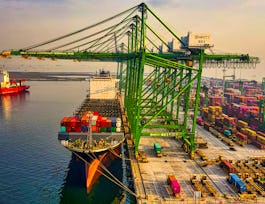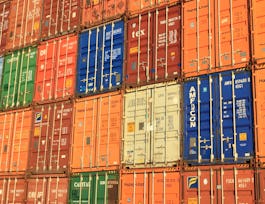Supply Chains are made up of a network of companies from the initial raw materials to the ultimate consumer of the finished product. Within this network of companies, there are three ongoing flows: products, information, and finances. To properly understand and manage the supply chain, you need to understand all the flows. If you do not consider all of the flows, you will miss opportunities or sub-optimize parts of the supply chain.



Operations Excellence
This course is part of Supply Chain Excellence Specialization

Instructor: Rudolf Leuschner, Ph.D.
Sponsored by Coursera for Reliance Family
1,960 already enrolled
(17 reviews)
Recommended experience
Skills you'll gain
Details to know

Add to your LinkedIn profile
10 assignments
See how employees at top companies are mastering in-demand skills

Build your subject-matter expertise
- Learn new concepts from industry experts
- Gain a foundational understanding of a subject or tool
- Develop job-relevant skills with hands-on projects
- Earn a shareable career certificate


Earn a career certificate
Add this credential to your LinkedIn profile, resume, or CV
Share it on social media and in your performance review

There are 4 modules in this course
Manufacturing Excellence facilitates the transformation of products through the manufacturing system of the firm. To achieve manufacturing excellence, the firm must be able to produce items efficiently and effectively to the highest specifications at the lowest possible cost. The module is made up of the following two lessons: 1. Manufacturing Efficiency, 2. Contract Manufacturers
What's included
5 videos6 readings3 assignments2 discussion prompts
This module will focus on internal data and mostly highlight how companies can use data within the manufacturing environment. Specifically, we will introduce the Industry 4.0 concept. Afterwards, we have one more forecasting topic to cover. It will involve trends and seasonality.
What's included
14 videos7 readings4 assignments10 discussion prompts
This module focuses on how Supply Chain Management can contribute to the internal financial performance of the company. Specifically, the concept of Supply Chain Capital is explored, which is often the cheapest form of funding that a company can use. In addition, we discuss the importance of inventory to the financial standing of a company, but we also view it from the perspective of customer service.
What's included
6 videos4 readings3 assignments2 discussion prompts
Now that we have reached the end of this course, it is time to put all of your new knowledge to the test. Not only will you be able to take a second attempt at your SCM project by improving your original submission and adding a new section on information flow. Finally, you will perform a quantitative analysis of a real-life business case and suggest improvements.
What's included
1 reading2 peer reviews
Instructor

Why people choose Coursera for their career




Recommended if you're interested in Business


Rutgers the State University of New Jersey


Rutgers the State University of New Jersey


Rutgers the State University of New Jersey


University of London

Open new doors with Coursera Plus
Unlimited access to 10,000+ world-class courses, hands-on projects, and job-ready certificate programs - all included in your subscription
Advance your career with an online degree
Earn a degree from world-class universities - 100% online
Join over 3,400 global companies that choose Coursera for Business
Upskill your employees to excel in the digital economy



